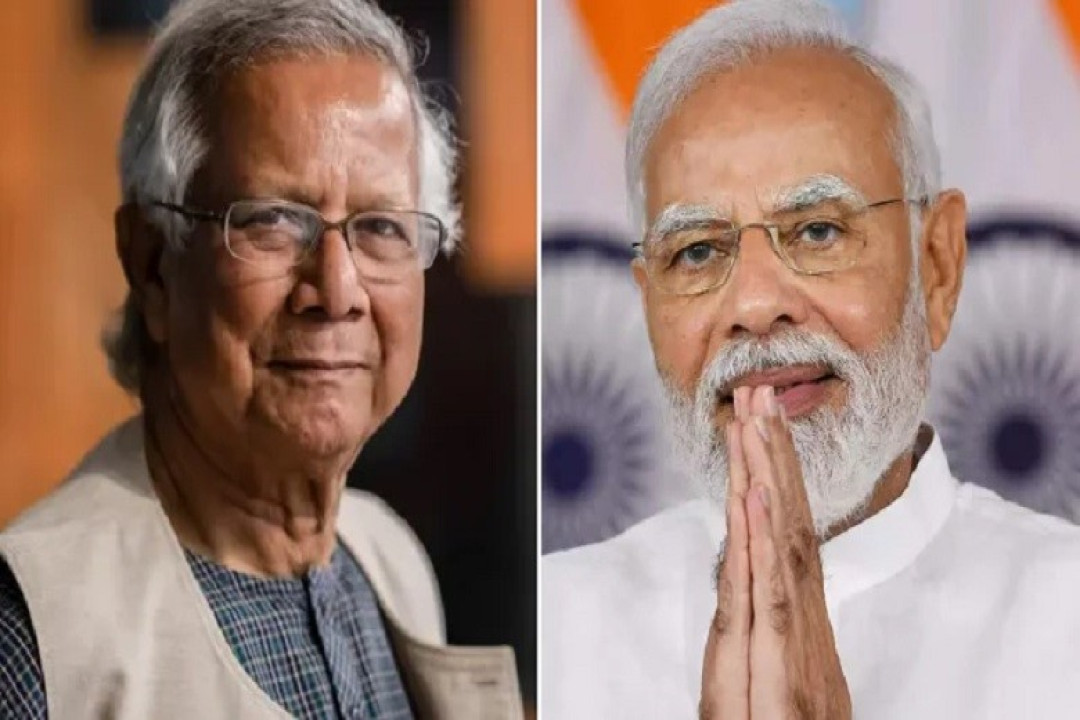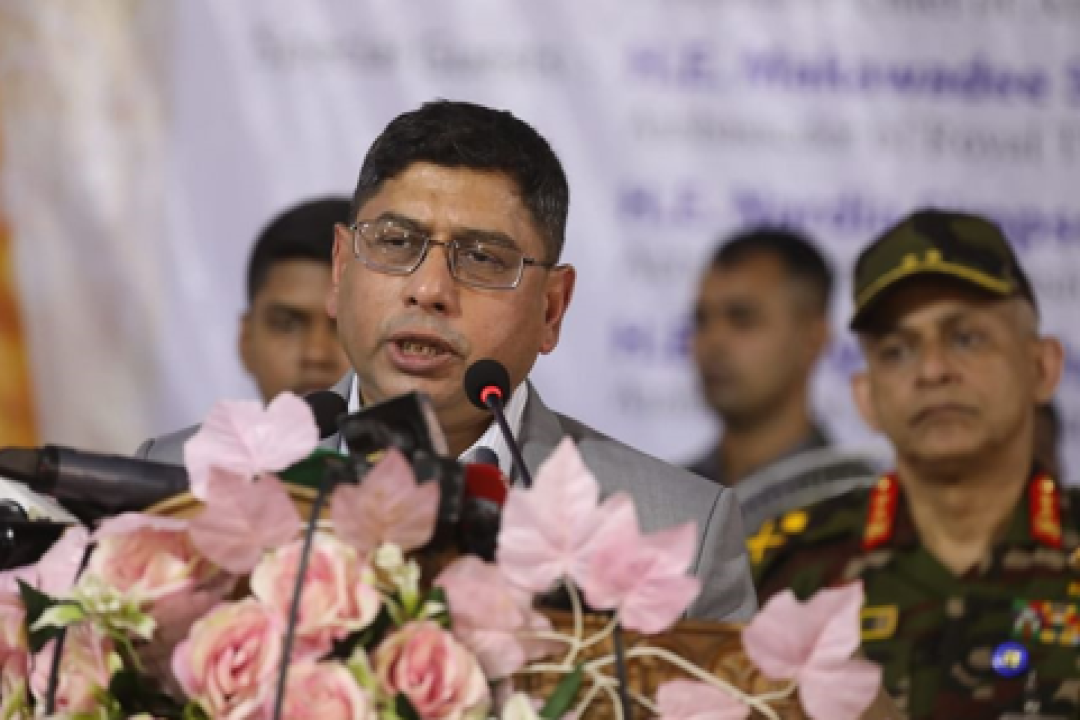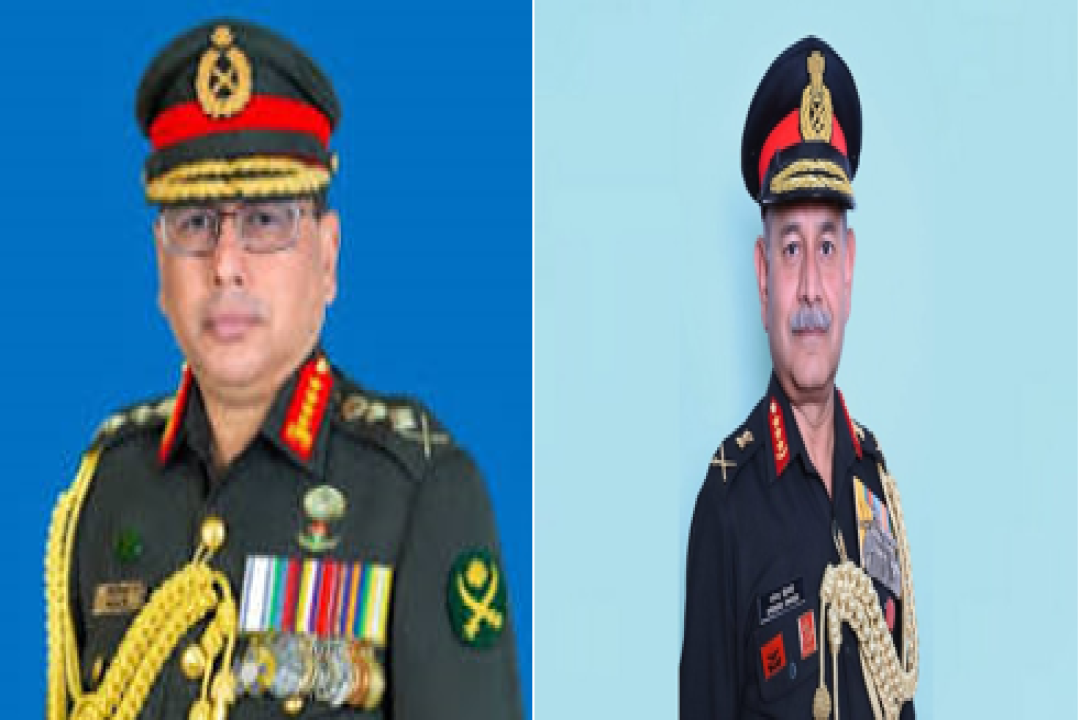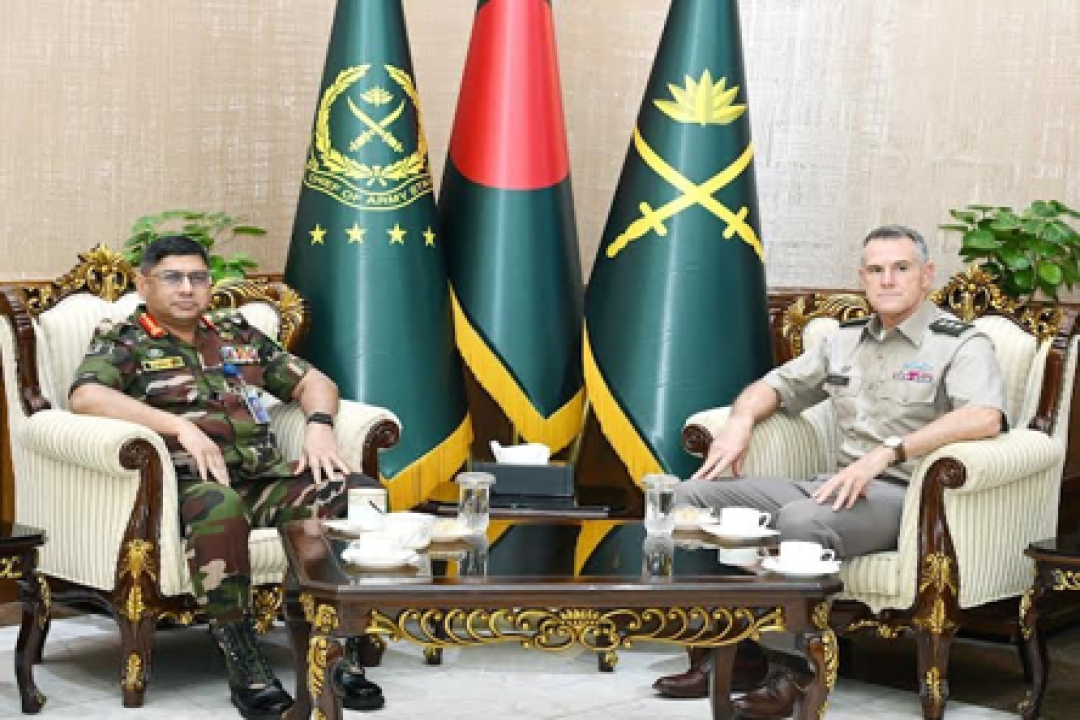It is, indeed, a strong-worded message for New Delhi - ‘Sheltering Sheikh Hasina casts a deep shadow over the relationship between Bangladesh and India. She has to be brought back for trial, or the people of Bangladesh won’t be at peace. India must come out from its long-held political narrative regarding Bangladesh to move forward.’
The Chief Adviser of interim government Professor Dr. Muhammad Yunus left this strong-worded message recently while giving an interview with the Press Trust of India (PTI). The Chief Adviser issued a firm call for the return of Sheikh Hasina from India to face trial in Bangladesh.
Dr. Yunus underscored the importance of holding Hasina accountable for the atrocities she is charged with committing during her stay in power. “She has to be brought back, or the people of Bangladesh won’t be at peace. The kind of atrocities she has committed must be addressed through a trial here.”
Dr. Yunus was critical of Hasina’s public statements made from India, calling them an “unfriendly gesture” that has caused discomfort in both countries.
Hasina, who fled to India on August 5, following students-led uprising, released a statement on August 13, demanding justice for those involved in “terror acts,” killings, and vandalism during the protests.
“It is not good for us or for India. There is discomfort regarding it,” Dr. Yunus stated, referring to Hasina’s continued involvement in political discussions from India. “If India wants to keep her until the time Bangladesh wants her back, the condition would be that she has to keep quiet,” he added.
The Chief Adviser emphasized that Hasina’s public remarks, shared through her son Sajeeb Wazed Joy’s Facebook page, were problematic as they interfered with efforts to bring her to justice.
“Had she been quiet, we would have forgotten it; people would have also forgotten it as she would have been in her own world. But sitting in India, she is speaking and giving instructions. No one likes it,” he noted.
“The interim government has expressed its stance to India verbally and ‘quite firmly’. Hasina has been given shelter there, and she is campaigning from there. It is not that she has gone there on a normal course. She fled following a people’s uprising and public anger,” Dr. Yunus pointed out.
Notably, this strong-worded message has come from Dr. Younus just days after BNP Secretary General Mirza Fakhrul Islam Alamgir said that it was crucial to start a new chapter in Indo-Bangla ties, which should begin with the extradition of Hasina, as her continued presence in India could further damage bilateral relations.
“Sheikh Hasina has to face the law of Bangladesh for all the crimes and corruption committed by her and her regime. To enable this and respect the sentiments of the people of Bangladesh, India should ensure her return to Bangladesh,:” he said while speaking to PTI.
Now questions are being asked if Hasina can be extradited while an extradition treaty between Bangladesh and India is in place. India has not publicly commented on the issue. The Hindustan Times quoted India’s External Affairs ministry spokesperson Randhir Jaiswal as saying this was in the realm of hypothetical issues. “As we stated earlier, the former prime minister of Bangladesh came to India at very short notice for reasons of safety. We have nothing further to add on that matter,” Jaiswal added.
Some Indian experts say New Delhi will take its own interests into consideration before acting. “Do our critical interests lie in handing over Hasina to Bangladesh? They don’t. The legalese of the treaty does not matter,” a former Research and Analysis Wing (RAW) official, who has dealt closely with Bangladesh, told Indian Express.
The official said a “balancing act” is not needed. “There are enough interests in Bangladesh who would want to have good relations with India. The Awami League has not been finished. It has deep roots. It will rise again. There is an administration and a military that values Bangladesh’s relations with India. So, we have a critical mass that favors good relations,” he added.
A former diplomat also added his voice. “First of all, this is an interim government. Its statements should not bother India much. It is a regular government that India will look to engage with in the long term and thus pay heed to.”
Some Indian experts also came up with a different narrative while talking to The Guardian as saying, “for India, Bangladesh is not just any neighboring country. It’s a strategic partner and a close ally crucial to India’s border security, particularly in the north-eastern states. So, Delhi has to work hard to ensure its own interest.”
“It’s a setback in the sense that any turbulence in our neighborhood is always unwanted,” says Pinak Ranjan Chakravarty, a former Indian High Commissioner in Dhaka. But the former diplomat insists that Delhi will work with the interim government in Dhaka because “there is no choice” and “you can’t dictate what they do internally.”
Notably, Sheikh Hasina’s continued presence in India has generated challenges for Delhi in developing a strong relationship with the new interim government in Dhaka. She was initially expected to stay in India for just a short period, but reports say her attempts to seek asylum in the UK, the US and the UAE have not been successful so far.
In this evolving situation, India wouldn’t want to ask its trusted friend Hasina to leave the country when her future remains uncertain and come across as leaving a formidable former ally in the lurch. At the same time, Delhi can’t afford to lose its influence in Bangladesh after Maldives and Nepal if it wants to protect its status as a regional power, especially as rival China is also jostling for influence in the region. So, sheltering Hasina will remain a potential threat for India’s strategic interest in the days to come.
Dr. Yunus expressed his displeasure on India for its long-held political narrative regarding Bangladesh. He criticized the belief that Bangladesh will descend into chaos without Hasina’s leadership, a narrative that has been promoted within some political circles in New Delhi.
“The narrative is that everybody is Islamist, the Bangladesh Nationalist Party (BNP) is Islamist, and everyone else is Islamist and will make this country into Afghanistan. And Bangladesh is in safe hands with Sheikh Hasina at the helm only. India is captivated by this narrative. India needs to come out of this,” Yunus said.
He also came up with his desire for stronger ties with India, calling for enhanced cooperation to mend the strained relations between the two nations. “We need to work together to improve this relationship, which is currently at a low point,” he noted.
However, the downfall of Sheikh Hasina’s regime marks a significant transformation for Bangladesh and also signals the crumbling of this narrative enforced by India, which sought to alienate Bangladesh from the nations in this region and beyond.
Throughout her tenure, Hasina systematically suppressed dissent, imprisoned opposition leaders and curtailed fundamental freedoms. In the name of maintaining stability and fostering economic progress, it orchestrated a severe crackdown on political adversaries, journalists and rights activists.
Despite frequent criticism from human rights groups, India remained conspicuously silent, prioritizing strategic alliances over democratic principles and facilitated the narrative that painted Bangladesh as a thriving nation under a strong leadership.
India has long maintained that if the BNP won an open election, it could destabilize the region as the Islamist groups would exploit Bangladesh as a base for extremism. For many years, India has strategically used the narrative of Islamist terrorism to maintain a divided South Asia. By framing Islamist terrorism as a pervasive threat, India justifies its internal security policies and consolidates its role as the regional stabilizer.
Furthermore, the unraveling of this narrative exposes the limitations of Indian democracy itself. While India has often positioned itself as the world's largest democracy, its foreign policy has been marked by a selective endorsement of democratic values. The support for authoritarian regimes like Hasina’s, which align with its geopolitical interests, raises questions about the integrity of India's democratic ethos.
India’s threat narrative of Islamist terrorism was aimed at consolidating its influence and keeping South Asia fragmented, with Bangladesh as a key piece in its geopolitical chess game. However, Hasina's abrupt departure not only exposes the limitations of this narrative but also signals a significant setback for India’s regional dominance.
Professor Dr. Yunus also focused on the issue of minority people. The Chief Advisor emphasized that recent attacks on the Hindu minority were more ‘political than communal’ and criticized India’s portrayal of the incidents. “These attacks are political in nature, not communal. India is amplifying these incidents in a significant way. We are not saying we are helpless; we are addressing the situation,” Yunus stated.
He further dismissed concerns raised by India regarding recent attacks, calling it an “excuse” and insisting that these issues should not be overstated in diplomatic discussions. “The issue of trying to portray the conditions of minorities in such a big way is just an excuse,” he remarked.
However, India has earned reputations of playing minority card frequently with an ill political motive. Indian Prime Minister Narendra Modi, in his Independence Day address, highlighted the concerns of 1.4 billion Indians regarding the safety of minorities in Bangladesh, which has generated anger among the people of Bangladesh.
The question of minorities is an internal matter of Bangladesh. When India makes it an issue, Bangladesh needs to address it at an international forum. Bangladesh never complain about what happens to Indian minorities. So, no one should comment on the issue of minorities here in Bangladesh.
We witnessed, over the last 15 years, the Bangladesh- India relationship essentially became a relationship with one individual- Sheikh Hasina and one party- Awami League. Hasina’s close personal ties with both the BJP and Congress parties in New Delhi forced Bangladesh to become India’s closest and most loyal regional ally. At the same time it gave India a crucial foothold in their often unfriendly neighborhood and kept Bangladesh away from other stakeholders in the region.
Hasina also embraced Indian influences through economic and security cooperation, including access to crucial road, rail and waterways and allowing Indian businesses to do lucrative deals in Bangladesh.
In return, India turned a blind eye as her regime became increasingly oppressive and autocratic. Indian policymakers were actively engaged in intervening in Bangladesh’s affairs to keep Hasina in office, as well as pressuring other countries to accept her leadership. So, this unconventional nature of the relationship between the two neighbors over the past 15 years gradually became a source of consternation in Bangladesh.
“India pursued a very myopic policy with Bangladesh by putting all their eggs in one basket with Hasina and her party, instead of having a state-to-state relationship,” said Professor Ali Riaz, a political scientist specializing in Bangladesh at Illinois State University. “As a result, India is now in a precarious situation of its own making.”
India views the events in Bangladesh that led to Hasina’s overthrow as a setback for security, trade and connectivity and a possible loss of influence. India has made “lots of mistakes” in Bangladesh in last 15 years, even after Sheikh Hasina’s downfall.
Some Indian media outlets have been pushing claims that Pakistan and China were behind the protests, as well as exaggerating the scale of attacks on Hindu minorities. Anti-Muslim coverage has pushed the narrative that Pakistan wants to turn Bangladesh - a Muslim country that upholds secular principles - into an Islamic state.
The most striking feature of Indian foreign minister S Jaishankar’s statement at the Lok Sabha on August 6, following Hasina’s downfall, was the complete absence of the Awami League government's egregious violation of human rights, and the killings of over 800 people including youth, since July 16.
He began setting up a context for the people’s uprising saying that there had been “considerable tensions, deep divides and growing polarization in Bangladesh politics” since the January election. “There was growing violence, including attacks on public buildings and infrastructure, as well as traffic and rail obstructions.”
Jaishankar’s statement does not even hint that Sheikh Hasina’s regime reacted with overwhelmingly excessive force against students, and police opened fire on protesters with live rounds, killing more than 800 people in the span of 23 days.
So, given the facts suggest that India has failed to see the new reality in Bangladesh, which could become a significant obstacle to establishing a “proper and balanced” relationship with a post-revolutionary Bangladesh government under the leadership of Professor Dr. Yunus.
The Indian policymakers should keep in mind that just a few months ago, an anti-India campaign, led by some social media activists, had gained significant traction due to mounting anger over India’s long-perceived meddling in Bangladesh’s internal affairs.
India’s former Foreign Secretary Nirupama Menon Rao cautioned New Delhi against acting in haste and to come out on the right side of history. “Today, as we see momentous happenings in Bangladesh and when the voice of the people has seen the flight of Sheikh Hasina from the country, we must weigh our reactions and policy moves with both caution and a capacity to think on our feet with agility, a clear focus and foresight. We cannot afford any misstep. There are strategic dilemmas involved here. Whatever we do, we must protect our long-term national interest,” she wrote on X.
So, time has come for New Delhi to review its approach to Bangladesh and the mindset after Sheikh Hasina’s downfall. There is an urgent need for India to accept that Hasina is gone - she is now history - and the relationship with Bangladesh has to be completely reset and rebooted. New Delhi should remember that turning a neighboring country with 18 crore people into a sworn enemy won’t help India any more.
November 24, 2024
Dhaka set to sign defense deal with TokyoNovember 24, 2024
Magistracy power for officers of Armed Forces for another 60 daysNovember 24, 2024
Government to decide how long army will remain deployed in the fieldNovember 24, 2024
Army recovers huge cache of arms, ammunition from KNF denNovember 24, 2024
Army cautions against misuse of its name in jhut business: ISPRNovember 24, 2024
Singapore’s high commissioner meets Army ChiefNovember 24, 2024
Army chief visits Cox’s BazarNovember 24, 2024
65 citizens from Myanmar's tribal communities enter Bangladesh illegallyNovember 24, 2024
Who is Trump intelligence pick Tulsi Gabbard?November 24, 2024
Pentagon stunned after Trump picks Pete Hegseth for Defense SecretaryNovember 24, 2024
Ukraine marks 1,000 days of war with pledge to ‘never submit’ to RussiaNovember 24, 2024
Arrest warrants issued for Netanyahu, Gallant over war crimesNovember 11, 2024
Deputy Commander of US Indo-Pacific Command calls on Army ChiefNovember 11, 2024
Air chief off to China on nine-day visitNovember 11, 2024
Recruit batch parade of EME and ACC Corps heldFollow Us

50,000
Fans

50,000
Fans

50,000
Fans

50,000
Fans

50,000
Fans

50,000
Fans







